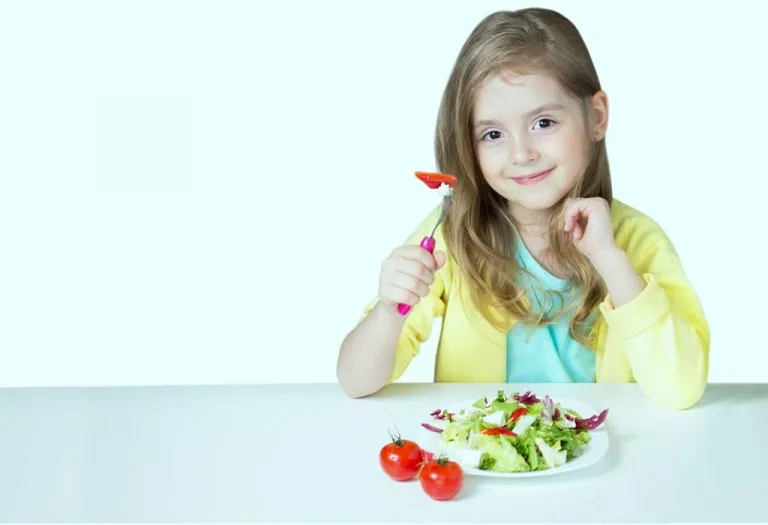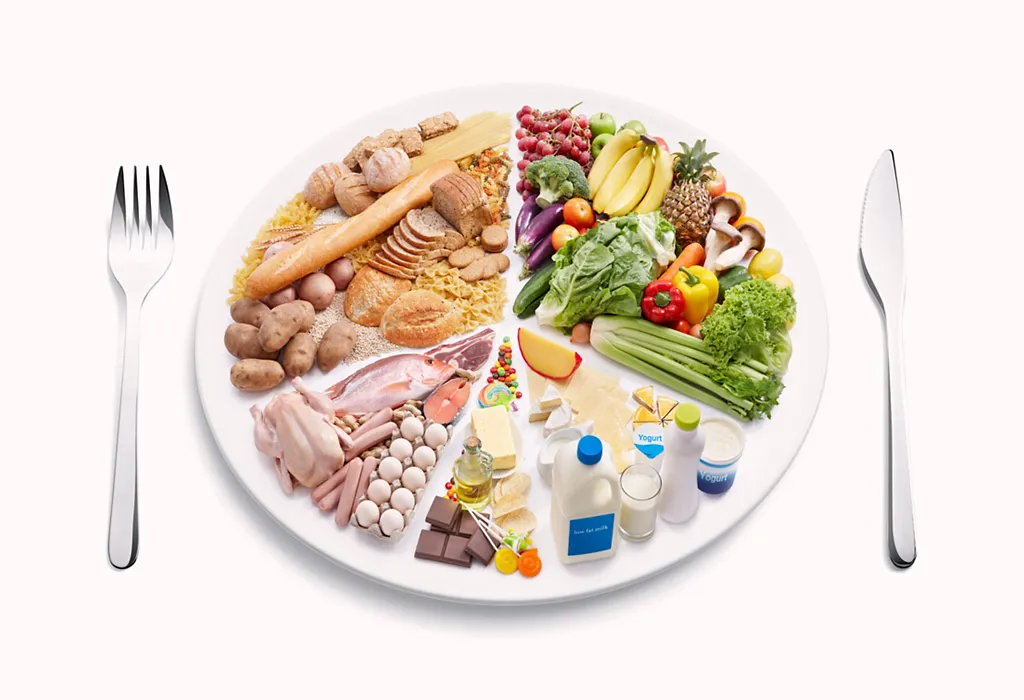Nutrition for Kids – Importance, Chart and Age-wise Food Plan

Every parent plans meticulously for the healthy growth and development of their child; this starts with healthy meals packed with nutrients, minerals, and vitamins that are essential to their development (1). Proper nutrition for kids ensures they have the energy and building blocks needed for physical and cognitive growth. Planning a diet for children is never easy, as their metabolism is faster, and they can process food more efficiently than an average adult. By focusing on nutrition for kids, parents can support their immune systems, brain development, and overall well-being. Understanding the nutritional requirements for children is key to raising healthy, happy, and active individuals.
Importance of Nutrition for Children
The right nutrition for children can result in many benefits for your child, apart from not having any nutritional deficiencies (2).
- A good nutritional plan will ensure the right kind of growth and development.
- Healthy food habits learnt during childhood will ensure that your child will have a healthier life as an adult. Studies have shown that adults who had a nutritionally balanced childhood have lesser instances of high cholesterol or high blood pressure. These individuals also have lesser chances of developing diabetes, heart disease, and cancer.
- With good nutrition, many diseases can be kept at bay. Conditions like iron deficiency, dental cavities, and osteoporosis can be avoided to a large extent.
- Good nutrition will provide your child with the right balance of energy as he grows up. He will be able to participate in activities that will keep him active and healthy.
- A healthy nutrition plan will help prevent obesity. Obesity amongst children is fast becoming one of the biggest health concerns of our times. Diseases caused by obesity like type two diabetes and high cholesterol are now commonly seen in children. Ensuring that a diet rich in fruits, vegetables and fibre will help stave off obesity.
- Creating valuable and good eating habits is a natural by-product of good nutrition during childhood. Learning when and how much to snack while balancing meals are important lessons that must be learnt early in life.
- Breakfast is one of the most skipped meals of the day. It is one of the most harmful meals to miss as it helps regulate blood sugar levels and improves brain function. It refuels the body after a gap of almost 10 hours, so it is important to eat a proper breakfast in the morning.
- Eating healthy at an early age will ensure that your child hits puberty at the correct age. Girls will find that their menstrual cycle is more regular with far lesser complications.
- A well-balanced diet from an early age helps improve physical and mental development. Many doctors argue that a healthy diet can help a child grow taller, have a better metabolism and can even improve their skin health.
- Eating healthy from an early age will assist in building your child’s self-esteem and help regulate brain chemicals to fight off anxiety and depression.
Age-wise Child Nutrition Chart
You must change the kind of food you give your child according to his age and gender. Different ages require different ratios of nutrients and quantities of calories. You can follow the nutrition chart for kids below to understand the same and develop food plans accordingly (3).
| Age Group | Name of Food Group | Daily Requirement for Boys | Daily Requirement for Girls | Sources |
| 2-3 years | Protein | 20 gm | 20 gm | Pulses, chicken breast, soya nuggets, egg whites |
| Fruits | 1-1.5 cups | 1-1.5 cups | Apples, bananas, seasonal fruits, papaya, watermelon | |
| Vegetables | 1-1.5 cups | 1-1.5 cups | Potato, eggplant, ladies finger, radish, carrots, beets, yams, sweet potato, seasonal fresh vegetables | |
| Grains | 100gm | 100gm | Rice, whole wheat, millets like jowar and bajra | |
| Dairy | 2 cups | 2 cups | Milk, curds, fresh cheese | |
| 4-8 years | Protein | 30-40 gm | 30-40 gm | Pulses, chicken breast, soya nuggets, egg whites |
| Fruits | 1-1.5 cups | 1-2 cups | Apples, bananas, seasonal fruits, papaya, watermelon | |
| Vegetables | 1.5-2.5 cups | 1.5-2.5 cups | Potato, eggplant, ladies finger, radish, carrots, beets, yams, sweet potato, seasonal fresh vegetables | |
| Grains | 250 gm | 250 gm | Rice, whole wheat, millets like jowar and bajra | |
| Dairy | 2.5 cups | 2.5 cups | Milk, curds, fresh cheese | |
| 9-13 years | Protein | 55 gm | 55 gm | Pulses, chicken breast, soya nuggets, egg whites |
| Fruits | 1.5-2 cups | 1.5-2 cups | Apples, bananas, seasonal fruits, papaya, watermelon | |
| Vegetables | 1.5-2.5 cups | 1.5-2.5 cups | Potato, eggplant, ladies finger, radish, carrots, beets, yams, sweet potato, seasonal fresh vegetables | |
| Grains | 300 gm | 300 gm | Rice, whole wheat, millets like jowar and bajra | |
| Dairy | 3 cups | 3 cups | Milk, curds, fresh cheese | |
| 14-18 years | Protein | 70-80 gm | 65-70 gm | Pulses, chicken breast, soya nuggets, egg whites |
| Fruits | 2-2.5 cups | 1.5-2 cups | Apples, bananas, seasonal fruits, papaya, watermelon | |
| Vegetables | 2.5-4 cups | 2.5-3 cups | Potato, eggplant, ladies finger, radish, carrots, beets, yams, sweet potato, seasonal fresh vegetables | |
| Grains | 400 gm | 300 gm | Rice, whole wheat, millets like jowar and bajra | |
| Dairy | 3 cups | 3 cups | Milk, curds, fresh cheese |
What About Nutritional Supplements?
There are many nutritional supplements out there that could affect your child’s health. Not all the ingredients in these supplements are tested on children, and one cannot rule out side effects. Pre-adolescent and adolescent children might be interested in taking supplements for weight loss or muscle building. However, here are some things you must know (4):
- Products advertised as ‘natural’ do not necessarily mean safe. Find out from your paediatrician if your child can consume the same.
- Dietary supplements aren’t tested as rigorously as medicines are and are most likely not tested for children. This means that it could affect their health adversely.
- Studies have shown that many dietary supplements contain harmful substances like chemicals and fillers. Be sure to read the label carefully before buying the same
- There are a significant number of children who need emergency care every year due to dietary supplements.
Before giving your child any nutritional supplements, it is best that you get clearance for the same from your child’s doctor.
Consequences of Poor Nutrition in Children
It is important not just for you to understand kids nutrition, but for your child as well. While there are many ‘quick fix’ diets out on the internet today, remember that there can be dire consequences to poor nutrition in children. In fact, poor nutrition is considered a form of malnutrition. If not monitored carefully these consequences can lead to numerous illnesses like:
- Diabetes
- Stress
- Skin conditions
- Respiratory disorders
- Gastrointestinal disorders
- Renal failure
- Fatty liver
- Urinary tract infections
- Excretory tract infections
Talk to your doctor to keep yourself updated about the side effects of a poor diet and lacklustre nutrition.
Nutrition Tips for Children
Providing the right nutrition for kids is essential for their growth, development, and overall well-being. A balanced diet helps support their immune system, brain function, and energy levels. Here are some key tips to ensure children meet their nutritional requirements for children:
1. Include a Variety of Food Groups
Children need diverse nutrients for proper growth, so meals should include fruits, vegetables, whole grains, lean proteins (like chicken, fish, beans), and dairy (or fortified alternatives). Different colored fruits and vegetables provide various vitamins and antioxidants, while whole grains offer fiber for digestion. Rotating food choices prevents boredom and ensures a broad nutrient intake.
2. Limit Sugary and Processed Foods
Excess sugar can lead to energy crashes, weight gain, and tooth decay, so sweets, sodas, and packaged snacks should be occasional treats. Processed foods often contain unhealthy fats, salt, and additives that aren’t ideal for growing bodies. Instead, opt for whole-food snacks like sliced apples with nut butter or homemade oatmeal bars.
3. Encourage Healthy Hydration
Water is crucial for digestion, concentration, and physical activity, so kids should drink it throughout the day. Flavored waters or infused fruit slices can make hydration fun, while sugary drinks (like soda or juice boxes) should be limited. Milk or fortified plant-based milk also provides calcium and vitamin D for bone health.
4. Set Regular Meal and Snack Times
A consistent eating schedule stabilizes energy levels and prevents overeating or excessive hunger. Offer three balanced meals and 1–2 nutritious snacks (e.g., yogurt, whole-grain crackers with cheese) daily. Avoid skipping breakfast, as it fuels focus and metabolism for the day.
5. Be a Role Model
Kids learn eating habits by observing adults, so parents should prioritize nutritious meals and mindful eating. Family meals without screens encourage conversation and healthy portion control. Involving kids in grocery shopping or cooking can also spark their interest in nutritious foods.
Nutrition Activities for Children
Teaching kids about nutrition for kids can be fun and interactive through engaging activities. Hands-on learning helps them understand the importance of healthy eating while making it enjoyable. Here are some creative ways to educate children about nutritional requirements for children:
1. Cooking Together
Preparing meals as a family teaches kids about ingredients and healthy cooking methods. Simple tasks like washing veggies, stirring, or assembling wraps make them feel involved. Discuss how each ingredient benefits their body (e.g., “Carrots help your eyes see better!”).
2. Grow a Small Garden
Planting seeds for herbs, tomatoes, or lettuce teaches kids where food comes from. Tending to plants fosters responsibility, and harvesting encourages them to try what they’ve grown. Even a small windowsill garden with basil or sprouts can be educational.
3. Food Group Sorting Games
Use flashcards, toy food, or grocery ads to sort items into categories (fruits, grains, proteins, etc.). Turn it into a game—ask kids to “shop” for a balanced meal or guess which group a food belongs to. This reinforces their understanding of a varied diet.
4. Healthy Snack Challenges
Challenge kids to create their own snacks using wholesome ingredients (e.g., “Make a rainbow fruit kabob” or “Build a yogurt parfait with granola”). Praise creativity and explain how their choices give them energy (“Protein in yogurt helps your muscles!”).
5. Read Nutrition-Themed Books
Books like The Very Hungry Caterpillar introduce nutrition concepts in a playful way. After reading, discuss how the characters’ food choices affect their health or try recreating a healthy meal from the story.
How to Teach Your Child About Nutrition?
Teaching children about nutrition for kids doesn’t have to be complicated—it can be fun, interactive, and woven into daily routines. Here are five effective ways to help your child understand nutritional requirements for children while making learning enjoyable (5):
- Make meals a learning experience
- Grocery shop together
- Cook as a family
- Grow your own food
- Lead by example
Questions to Ask Your Doctor
Getting professional guidance about your child’s nutrition for kids can help address specific needs and concerns. Here are key questions to ask your pediatrician or dietitian about daily nutrition for kids (6):
- What are the most important nutrients my child needs at their current age?
- Is my child’s growth on track, and are there any dietary adjustments needed?
- How can I handle picky eating or food aversions?
- Are there any foods or supplements my child should avoid?
- What are healthy snack alternatives for busy schedules?
- How can I tell if my child has a nutritional deficiency?
FAQs
1. Can spices and herbs benefit my child’s health?
Many parents avoid spices, but mild amounts of turmeric (anti-inflammatory), cinnamon (blood sugar balance), and ginger (digestion) can boost immunity and flavor. Introduce gradually and watch for reactions.
2. Does my child need probiotics, and what are the best sources?
Gut health impacts immunity and mood—probiotics (yogurt, kefir, fermented foods) can help, especially after antibiotics. Ask your doctor about child-safe probiotic supplements if needed.
3. Are “healthy” packaged snacks (like veggie chips or granola bars) actually nutritious?
Many marketed as “healthy” are high in sugar, salt, or processed oils. Teach kids to read labels and opt for whole-food snacks (e.g., roasted chickpeas, homemade trail mix).
4. How does sleep affect my child’s nutritional needs?
Poor sleep increases cravings for sugary/carb-heavy foods and disrupts hunger hormones. Prioritize consistent bedtimes and discuss sleep’s role in nutrition with your pediatrician.
This was all about the nutrition for kids, and we have also included a sample food chart for kids. The most efficient way to build healthy habits while helping your child in physical development is by planning a well-balanced meal that is high in nutritional value. A good diet for children can do wonders to their development, but a bad one can have dire consequences. It is important to plan a child’s diet based on the factors mentioned above as well as their own needs. Consult a dietician for a comprehensive understanding of your child’s nutritional requirements.
References/Resources:
1. Britannica Kids – Food and Nutrition
2. British Nutrition Foundation – Nutrition for Children
3. Mayo Clinic – Nutrition for kids: Guidelines for a healthy diet
4. German Federal Institute for Risk Assessment – Food supplements for children – (not) a good idea?!
5. Nationwide Children’s Hospital – The Importance of Good Nutrition for Kids
6. FamilyDoctor.org – Healthy Eating for Kids
Also Read:
High Fiber Foods for Kids
Healthy Food Pyramid for Kids
How to Develop Good Food Habits in Kids
Was This Article Helpful?
Parenting is a huge responsibility, for you as a caregiver, but also for us as a parenting content platform. We understand that and take our responsibility of creating credible content seriously. FirstCry Parenting articles are written and published only after extensive research using factually sound references to deliver quality content that is accurate, validated by experts, and completely reliable. To understand how we go about creating content that is credible, read our editorial policy here.
















.svg)
















